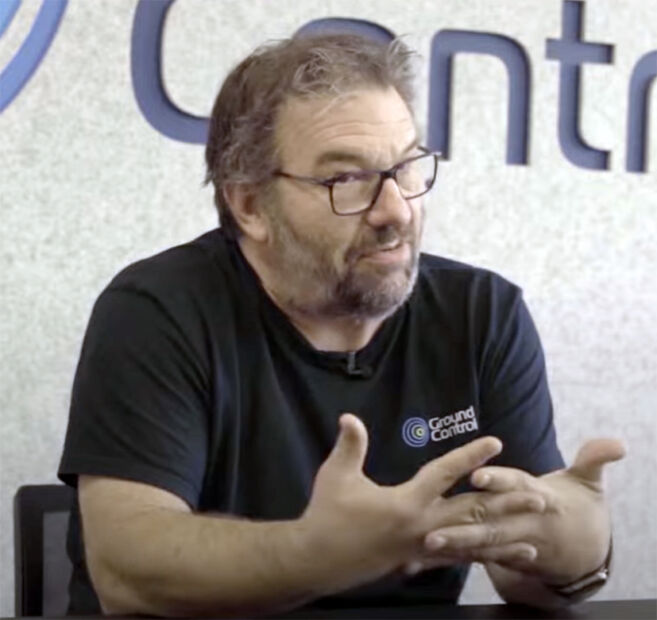When three into one does go
- September 11, 2022
- Steve Rogerson

UK and US firm Ground Control celebrates its twentieth birthday this month. Steve Rogerson talks with CEO Alastair MacLeod about the company’s success and future.
During the past twenty years, many companies have come and gone. But two decades ago this month, Mark Wright, a pioneer in internet services, set up Ground Control as a satellite service provider, and it is still going strong.
But a lot has changed since then. For a start, US-based Ground Control is now under the umbrella of UK private equity firm Horizon, which a few years ago decided to merge Ground Control with two UK technology companies – Wireless Innovation and Rock Seven.
Wireless Innovation was founded by Phil Rouse, still a consultant with the merged Ground Control company, to use satellite communications for industrial applications, monitoring and controlling remote equipment.
In 2004, Ric Searle and Nick Farrell founded Rock Seven to use satellites to track people using small commercial devices; one of the early applications was tracking yachts to keep the crews safe.
So, that made three companies all using satellite technology but in very different ways. The ongoing task of bringing these together was given to Alastair MacLeod, who was appointed group CEO two years ago. I caught up with him last week to find out how it was going.
“We had three companies led by entrepreneurs who each were solving different problems using satellites,” he said. “We still had three separate teams and my task was to accelerate the coming together so by 2024 we could go back on the acquisition trail. Horizon wants to create a multi-faceted view of satellite communications.”
While integrations take time to bed in, most of key tasks are now for the most part done and have been for at least six to nine months.
“My task was and has been to get the merged companies performing as one single high-performing company, getting from three into one and then making it fly, which is never an overnight task,” he said.
MacLeod has experience in fixed and mobile communications but though he has an engineering background he sees himself as a sales guy at heart. His involvement in general management for small and large companies provided the experience to take three smaller companies and create one large one. After working in Switzerland for a while, he returned to the UK and was attracted by what Horizon was trying to do.
“I love management challenges,” he said. “These were three businesses that needed putting together. But I am also an engineer, and I liked the technology. I love solving problems; the technology was cool and the problem was interesting.”
Being an engineer, he has been impressed with the way technology has changed in the twenty years since Ground Control was founded. Computing power over that time has soared to enable the types of technology breakthroughs we are seeing today, such as the whole virtualisation sector. He also sees the ongoing miniaturisation trend as “enabling incredible stuff”.
On the down side, the period has seen an increasing threat from cyber attacks and what that means for both everyday technology users and critical national infrastructure. This, MacLeod believes, is a plus for Ground Control with its experiences of satellites, particularly private networks over satellites. In some instances, companies want to air-gap their infrastructure from public networks.
“This is absolutely something we are strong in and can help with,” said MacLeod.
Also relevant to the Ground Control portfolio has been the way the costs for using space technology have dropped dramatically.
“Twenty years ago, it had to be high value to use space,” he said. “That has changed with LEO [low Earth orbit] and nanosatellites and so on. It has opened up the ability to do a lot more with space.”
But it does not stop there. He thinks the next five to ten years will see many advances in how we use space.
“Handheld devices can communicate with satellites and that is bringing space more into consideration, particularly for IoT applications,” he said. “Because of these changes, we will see a resetting of the communications world order. For players such as us, this will create opportunities. We will have more ways to solve problems for customers.”
Today, Ground Control uses satellites for IoT and M2M communications, serving some 4500 customers in 120 countries. It has 120 employees and turns over $36.5m a year. MacLeod plans to grow that team, bringing in new skills to find new ways to use space hardware.




